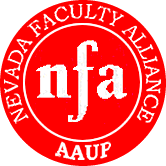This bill is part of a national effort, sponsored by the National Rifle Association, to push comparable bills through state legislatures. This effort, however, has met with resistance from college administrators, students and conservatives (including Arizona Governor Jan Brewer and republican caucuses in the Texas and Florida state legislatures) who oppose a one-size-fits-all approach to such a difficult issue and who believe campus safety and student rights are best addressed on campus.
A group representing the families of victims and survivors of the Virgina Tech campus shooting submitted testimony in opposition to the bill, as did the NFA in the form of an analysis by two UNLV criminologists and a CSN student showing campuses are considerably safer and less likely to be the sites of violent crimes against persons than the rest of society
At Wednesday's hearing, the bill's sponsor, Senator John Lee, presented the bill as being "not about campus security but about student rights," and invited a UNR student who had been the victim of a horrific assault on campus, and her father, to testify. These opening remarks generated great emotion but little discussion of the specifics of the bill, and Senator Lee and the victim's father expressed significant hostility towards faculty, whom Senator Lee referred to as "elite intellectuals ....who work for us".
Much of the hearing consisted of testimony from campus police (UNR, CSN and UNLV in person and TMCC police by written testimony) and from local law enforcement agencies around the state, who oppose the bill. Their testimony was received rather hostilely by some members of the committee, leading to some very interesting (and lengthy) exchanges.
However, most of the specific testimony on the bill itself came from representatives of the System, including Chancellor Klaich, the above-mentioned campus police officers (the UNR captain was particularly informative and all were lucid and detailed in their testimony), several faculty members (most notably Leah Wild of UNR) and students (notably Amee Riley of CSN). Several NSHE leaders, including NSC president DiMare and NSC student government president Sebring Frehner, and UNLV Vice-President for campus services Juanita Fain, attended but had to leave before they could testify.
I testified, as did Jim Richardson, formally on behalf of NFA, to express our opposition to the bill in its current form. We focused on the legal issues that have been raised -- notably that current NRS and NSHE Code does not in fact ban concealed weapons but requires CCW-permit carriers request and receive permission from campus presidents to carry concealed weapons on campus.
We also focused on problems in the current bill that does not clarify which parts of campus would be open to concealed carry and which parts (such as schools, day care centers, performing arts venues, dormitories, fraternities/sororities of campus -- all discussed at the hearing) should be considered what the case law calls "sensitive places" that are exempt from all concealed weapons. We emphasized that with only six says left in the session, there is not adequate time to study the specific geography of each campus and discuss the policing strategies of each campus sufficiently to craft effective legislation.
So we urged the legislature to leave this issue where it is best addressed, and where it constitutionally belongs, with the Board of Regents and campus presidents.
I will post a fuller account of our testimony.
This morning, a national advocacy group for school and campus safety launched an action alert against SB 231.
Faculty, students, staff and community members concerned about SB 231 should please read this alert and contact key legislators indicated to urge them to oppose SB 231
Faculty, students, staff and community members concerned about SB 231 should please read this alert and contact key legislators indicated to urge them to oppose SB 231






No comments:
Post a Comment